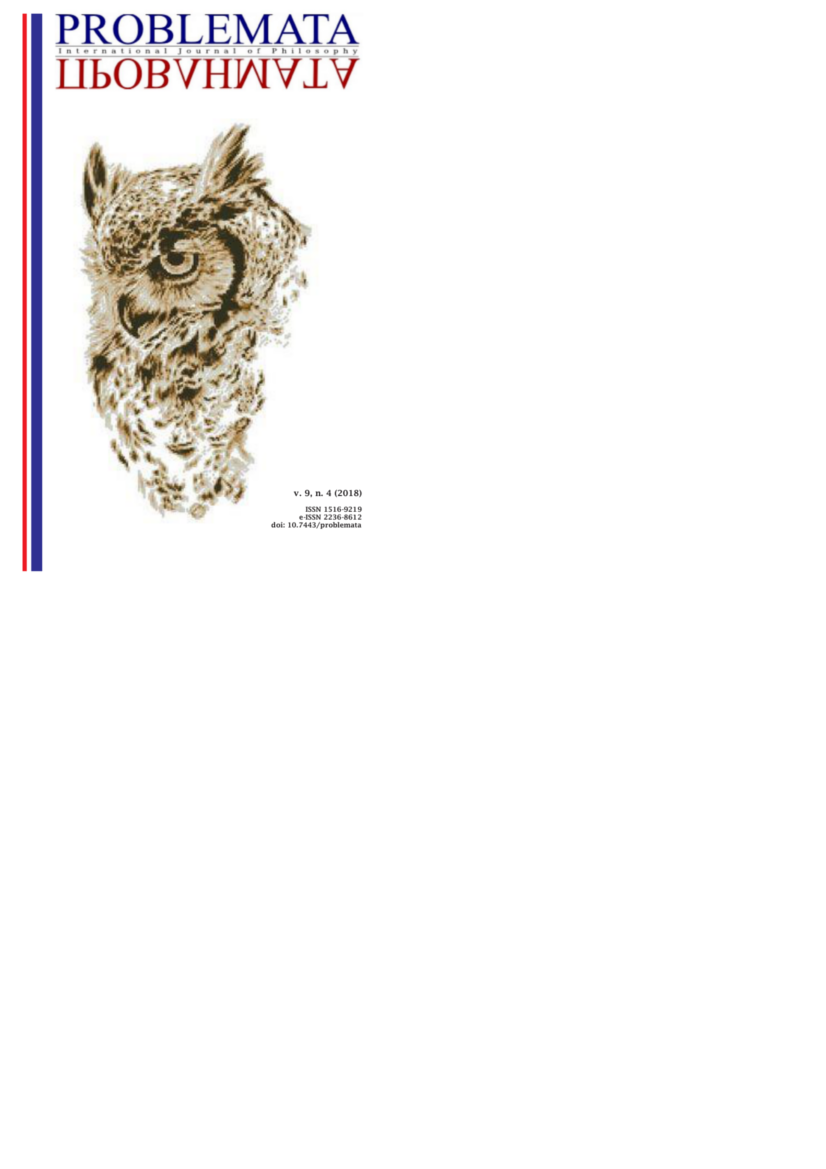KIERKEGAARD AND THE TRANSFORMATION OF THE SUBJECT IN HIMSELF BETWEEN THE VERTIGO OF LIBERTY AND THE ABSOLUTE PARADOX OF FAITH
DOI:
https://doi.org/10.7443/problemata.v9i4.38884Keywords:
Kierkegaard, Socrates, irony, anguish, subjectivity, faith.Abstract
Attributing to irony the possibility of exercise and development of subjective freedom, Kierkegaard emphasizes absolute negativity as characteristic of the said process in Socrates, converging to point out the absolute and irreducible value of the individual in a movement that implies the absolute beginning of the personal life between to create oneself (poetically) and let yourself be created (poetically). As opposed to the dissolution of human existence on the frontiers of pure intellectual conceptualization, Kierkegaard points out the unreliable tension between existence and transcendence in a movement that implies interiority and is in keeping with the need to become subjective, in view of the a perspective that holds that truth consists in the transformation of the subject into itself between the vertigo of freedom and the paradox of faith in a process that contains anguish and despair and converges for the transition from ethical to religious.
Downloads
References
ALMEIDA, Jorge M.; VALLS, Álvaro L. M. Kierkegaard. Rio de Janeiro: Jorge Zahar, 2007.
BEAUFRET, Jean. Introdução às filosofias da existência: de Kierkegaard a Heidegger. Tradução de Salma Tannus Muchail. São Paulo: Duas Cidades, 1976.
BÍBLIA DE ESTUDO DE GENEBRA. Gênesis. Tradução de João Ferreira de Almeida. Revista e Atualizada. São Paulo / Barueri: Cultura Cristã / Sociedade Bíblica do Brasil, 1999.
BINETTI, María J. La posibilidad necesaria de la libertad. Un análisis del pensamiento de Søren Kierkegaard. Pamplona/Spain: Cuadernos de Anuario Filosófico (Serie Universitaria, 177), 2005.
BRANDÃO, Junito de Souza. Mitologia grega. Volume I. Petrópolis / RJ: 1986.
FARAGO, France. Compreender Kierkegaard. São Paulo: Vozes, 2005.
GEISLER, Norman L. Enciclopédia de apologética: respostas aos críticos da fé cristã. Tradução de Lailah de Noronha. São Paulo: Editora Vida, 2002.
GILLES, Thomas Ranson. História do Existencialismo e da Fenomenologia. São Paulo: EPU – Editora da Universidade de São Paulo, 1971.
GOUVÊA, Ricardo Q. Paixão pelo Paradoxo. Uma Introdução a Kierkegaard. São Paulo: Fonte Editorial, 2006.
HEGEL, Georg Wilhelm Friedrich. Princípios da filosofia do direito. Tradução de Orlando Vitorino. São Paulo: Martins Fontes, 1997.
KIERKEGAARD, Søren Aabye. Diário de um sedutor; Tremor e Temor; O Desespero humano. Traduções de Carlos Grifo, Maria José Marinho, Adolfo Casais Monteiro. São Paulo: Abril Cultural, 1979.
KIERKEGAARD, Sören Aabye. O conceito de angústia. Tradução de Torrieri Guimarães. São Paulo: Hemus, 1968.
KIERKEGAARD, Søren Aabye. O conceito de ironia. Constantemente referido a Sócrates. Tradução de Álvaro Luiz Montenegro Valls. Petrópolis / RJ: Vozes, 1991.
KIERKEGAARD, Søren Aabye. Pós-Escrito às Migalhas Filosóficas. Tradução de Álvaro Luiz Montenegro Valls e Marília Murta de Almeida. Vol. I. Petrópolis / RJ: Vozes, 2013.
KIERKEGAARD, Søren Aabye. Textos selecionados. Tradução de Ernani Reichmann. Reimpressão. Curitiba: UFPR, 2001.
LE BLANC, Charles. Kierkegaard. Tradução de Marina Appenzeller. São Paulo: Estação Liberdade, 2003.
MORA, José Ferrater. Dicionário de filosofia. Tomo III (K-P). Tradução de Maria Stela Gonçalves et al. 2. ed. São Paulo: Loyola, 2004a.
MORA, José Ferrater. Dicionário de filosofia. Tomo IV (Q-Z). Tradução de Maria Stela Gonçalves et al. 2. ed. São Paulo: Loyola, 2004b.
PAULA, Marcio Gimenes. O silêncio de Abraão: os desafios para a ética em Temor e Tremor de Kierkegaard. Interações - Cultura e Comunidade, Belo Horizonte / MG, v. 3, n. 4, p. 55-72, 2008.
Downloads
Published
Issue
Section
License
Authors who publish with this journal agree to the following terms:
- Authors retain copyright and grant the journal right of first publication with the work simultaneously licensed under a Creative Commons Attribution License that allows others to share the work with an acknowledgement of the work's authorship and initial publication in this journal.
- Authors are able to enter into separate, additional contractual arrangements for the non-exclusive distribution of the journal's published version of the work (e.g., post it to an institutional repository or publish it in a book), with an acknowledgement of its initial publication in this journal.
-
- Authors are permitted and encouraged to post their work online (e.g., in institutional repositories or on their website) prior to and during the submission process, as it can lead to productive exchanges, as well as earlier and greater citation of published work (See The Effect of Open Access).





